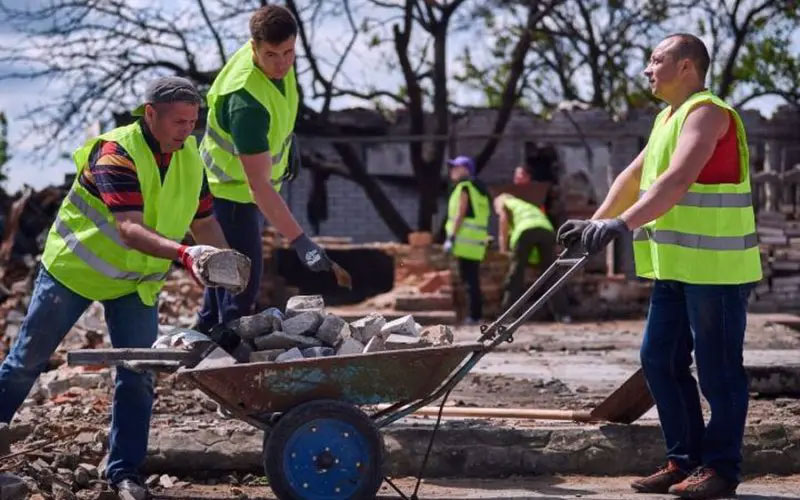active and purposeful military lawyer with more than 4 years of experience
Labor obligation, socially useful works and the employee's right to resign at his own will
During martial law, the legislation provides for the possibility of establishing labor obligations for citizens.
Labor obligation during martial law is not forced labor both in the sense of international legal acts and in accordance with the legislation of Ukraine.Thus, in accordance with the provisions of the Convention on Forced or Compulsory Labor No. 29 of the International Labor Organization (ILO), the term "forced" or "compulsory labor" in the sense of this Convention does not include:
• any work or service that is required on the basis of laws on compulsory military service and is used for work of a purely military nature;
• any work or service that is part of the normal civic duties of citizens of a fully self-governing country;
• any work or service required of any person as a result of a sentence issued by a judicial authority, provided that this work or service is performed under the supervision and control of the public authorities and that the said person is not given or transferred to the disposal private individuals, companies or associations;
• any work or service required under extraordinary circumstances, i.e. in cases of war or disaster, or threat of disaster, such as fire, flood, famine, earthquake, severe epidemics or epizootics, infestations of noxious animals, insects or vermin plants and generally circumstances that endanger or may endanger the life or normal living conditions of all or part of the population;
• minor works of a communal nature, i.e. works performed for the direct benefit of the collective by the members of this collective and which can therefore be considered ordinary civic duties of the members of the collective, provided that the population itself or its direct representatives have the right to express their opinion about the expediency of these works.According to Article 43 of the Constitution of Ukraine, military or alternative (non-military) service, as well as work or service performed by a person pursuant to a sentence or other court decision or in accordance with martial law and state of emergency laws, are not considered forced labor.
You may be interested in reading articles on: collection of debt from wages recovery of wages through court recovery of wage arrears recovery of wages recovery of wages in court recovery of wages through court recovery of unpaid wages
What documents regulate the labor obligation
The issue of establishment of labor obligation is governed by:
• Law of Ukraine dated May 12, 2015 No. 389-VIII "On the legal regime of martial law" (hereinafter - Law No. 389);
• The procedure for involving able-bodied persons in socially useful works under martial law, approved by Resolution No. 753 of the Cabinet of Ministers of Ukraine dated July 13, 2011 (hereinafter — Procedure No. 753).
According to Clause 2 of the first part of Article 8 of Law No. 389, the military command together with military administrations (in the case of their formation) may independently or with the involvement of the executive authorities, the Council of Ministers of the Autonomous Republic of Crimea, local self-government bodies introduce labor obligations for able-bodied persons, not involved in work in the field of defense and protection of critical infrastructure and not reserved for enterprises, institutions and organizations during the period of martial law for the purpose of performing works of a defensive nature, as well as eliminating the consequences of emergency situations that arose during the period of martial law, and to involve them under martial law in socially beneficial works that are performed to meet the needs of the Armed Forces of Ukraine, other military formations, law enforcement agencies and civil defense forces, to ensure the functioning of the national economy and the protection of critical infrastructure and do not, as a rule, require special professional training of persons . For employees involved in the performance of socially useful works, the previous place of work (position) is kept during the performance of such works. The procedure for engaging able-bodied persons in martial law to socially useful works and the issue of their social protection, taking into account the requirements of the law, are determined by the Cabinet of Ministers of Ukraine.
Definition of the terms "community service" and "labor obligation"
Clause 3 of Order No. 753 provides a definition of the terms "community service" and "labour duty".Socially useful works - types of temporary work of able-bodied persons under martial law, which are carried out for the performance of works of a defensive nature, liquidation of emergency situations of man-made, natural and military nature that arose during the period of martial law and their consequences, meeting the needs of the Armed Forces Forces, other military formations and civil defense forces, ensuring the functioning of the national economy and the system of ensuring the livelihood of the population, and also cannot be associated with entrepreneurship or other activities aimed at obtaining profit, and which include works and services that do not require , as a rule, special professional training.
Labor obligation - short-term labor obligation during the period of martial law for the purpose of performing works of a defensive nature, as well as liquidation of emergency situations of man-made, natural and military nature that arose during the period of martial law and their consequences, which does not require an obligation binding consent of the person in respect of whom such labor obligation is introduced.
Military accounting audit — comprehensive analysis of personnel documentation and verification of its compliance with legislative requirements
Involvement of able-bodied persons in socially useful works
Clause 2 of the first part of Article 8 of Law No. 389, Clause 1 of Order No. 753 envisages the involvement of able-bodied persons in socially useful works under martial law, which are carried out during the introduction of compulsory labor.
Thus, the labor obligation is introduced for employees involved in socially beneficial works.The decision on the introduction of compulsory labor and the involvement of able-bodied persons in the performance of socially useful works is taken by the military command together with military administrations (in case of their formation) independently or with the involvement of local state administrations, the Council of Ministers of the Autonomous Republic of Crimea, local self-government bodies (clause 4 of Order No. 753 ).
The decision on the introduction of compulsory labor and the involvement of able-bodied persons in the performance of socially useful works is brought to the attention of the population through the mass media. The decision states:
• substantiation of the need to involve able-bodied persons to perform socially useful works;
criteria for the selection of such persons, in particular by age, profession, specialty (if necessary);
the list of groups (brigades, squads) of able-bodied persons involved in the performance of socially useful works, their approximate number and the order of interaction in case of their formation;
type, list of types of socially useful works, for the performance of which able-bodied persons are involved;
boundaries of the territory, transport routes (or organization of delivery to the place of socially useful works) and the names of objects where the said works are planned to be performed;
the place and time of the gathering of able-bodied persons involved in the performance of socially useful works, the term of their performance;
officials who are responsible for informing, alerting and collecting the specified persons;
the customer (enterprise, institution, organization) of socially useful works where such persons will work;
other issues, the solution of which will contribute to the performance of such works (if necessary).





























